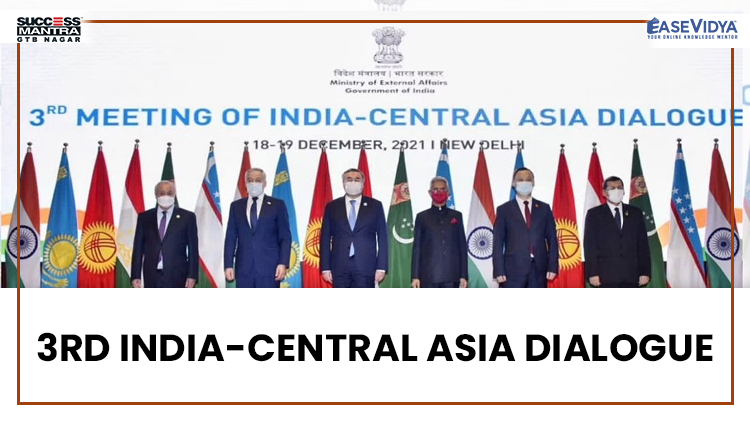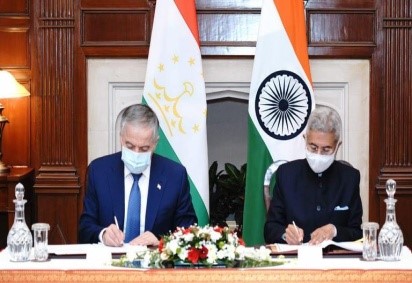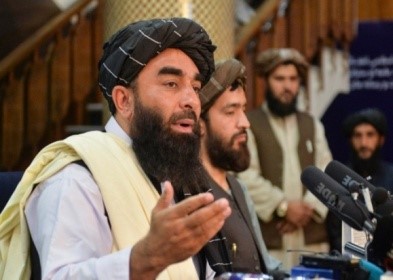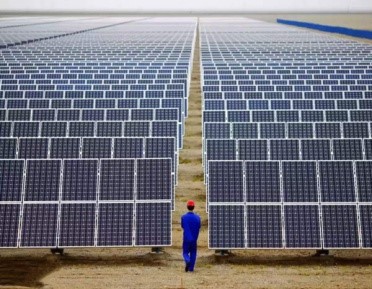
3RD INDIA CENTRAL ASIA DIALOGUE
3RD INDIA-CENTRAL ASIA DIALOGUE
Recently, the 3rd meeting of the India-Central Asia Dialogue was held in New Delhi. It is a ministerial-level dialogue between India and the Central Asian countries namely Kazakhstan, Kyrgyzstan, Tajikistan, Turkmenistan and Uzbekistan. India virtually hosted the second meeting of the India-Central Asia Dialogue in 2020.

Current Affairs Notes By Success Mantra Coaching Institute GTB Nagar Delhi CLICK HERE
INTERNATIONAL NORTH-SOUTH TRANSPORT CORRIDOR
Emphasis on optimum usage of the International North-South Transport Corridor (INSTC) as well as Ashgabat Agreement on International Transport and Transit Corridor to enhance connectivity between India and the Central Asian countries. Stressed on including Chabahar Port within the framework of INSTC and expressed interest in cooperation on issues related to the development and strengthening of regional connectivity in Central and South Asia. Agreed to develop the transit and transport potential of their countries, improve the regional logistics network and promote joint initiatives to create new transport corridors.
Connectivity Projects: The connectivity initiatives (China’s Belt and Road Initiative) should be based on the principles of transparency, broad participation, local priorities, financial sustainability and respect for sovereignty and territorial integrity of all countries.
SITUATION OF AFGHANISTAN
- Discussed the current situation in Afghanistan and its impact on the region, following the Taliban's occupancy. Issues like current humanitarian situation, terrorism, territorial integrity, respect for sovereignty and unity were discussed too. Pushed for concerted action against all terror groups. The Afghanistan’s soil must not be used for planning terror attacks, even as they pledged to provide immediate humanitarian aid to the Afghan people. Condemned all forms of terrorism and opposed “providing safe haven, using terrorist proxies for cross-border terrorism, terror financing, arms and drugs trafficking, dissemination of a radical ideology and abuse of cyber space to spread disinformation and incite violence. Supported a peaceful and stable Afghanistan and emphasized respect for sovereignty, territorial integrity and non-interference in its internal affairs. Pointed to the importance of UN Security Council Resolution 2593, which “unequivocally demands that Afghan territory not be used for sheltering, training, planning or financing terrorist acts and called for concerted action against all terrorist groups”.
- Counter Terrorism Efforts: Perpetrators, organisers, financiers and sponsors of terror acts must be brought to justice in accordance with principle of “extradite or prosecute”. Called on the world community to implement relevant UN resolutions, global counter-terrorism strategy and Financial Action Task Force standards.
- Line of Credit: All the countries are currently discussing the use of a USD 1 billion line of credit announced by India last year for infrastructure projects in Central Asia. A line of credit is a preset borrowing limit that can be tapped into at any time. The borrower can take money out as needed until the limit is reached, and as money is repaid, it can be borrowed again in the case of an open line of credit.
- Post-pandemic Recovery: All the countries stressed the importance of extensive vaccination and called for cooperation through sharing of vaccine doses, transfer of technology, development of local production capacities, promotion of supply chains for medical products, and ensuring price transparency.
- Restoration of Tourism: Backed the gradual restoration of tourism and business ties between India and the Central Asian countries. The foreign ministers of Kazakhstan and Kyrgyzstan welcomed the mutual recognition of Covid-19 vaccination certificates between India and their countries, while the ministers of Tajikistan, Turkmenistan and Uzbekistan sought early mutual recognition of certificates.

HISTORICAL & CULTURAL TIES
- Need to build on the historical and cultural ties of their region with India and highlight the potential for cooperation in areas such as connectivity, transport, transit and energy.
- International Solar Alliance: India highlighted the role of "International Solar Alliance (ISA)” initiative in collective, rapid and massive deployment of solar energy for effective implementation of the Paris Agreement.
- Coalition for Disaster Resilient Infrastructure: India also underlined the role of "Coalition for Disaster Resilient Infrastructure (CDRI)” in promoting disaster resilient infrastructure for reducing economic losses.
- Permanent membership at UNSC: Reiterated support of their countries for permanent membership of India in an expanded and reformed UN Security Council (UNSC). Welcomed the ongoing non-permanent tenure of India in the UNSC and its priorities.
- Indian Technical and Economic Cooperation: Appreciated the important role of the Indian Technical and Economic Cooperation (ITEC) Programme in capacity building and human resource development of their countries, especially in Information Technology and Communication Skills in the English language.
INDIA-CENTRAL ASIA DIALOGUE
It is a ministerial-level dialogue between India and the Central Asian countries namely Kazakhstan, Kyrgyzstan, Tajikistan, Turkmenistan and Uzbekistan. All five nations became independent states after the collapse of the USSR in 1991, post-Cold war. All the countries participating in the dialogue, except for Turkmenistan, are also members of the Shanghai Cooperation Organization. The dialogue focuses on a number of issues including ways to improve connectivity and stabilize war-ravaged Afghanistan.
PRAVAHINI Current Affairs Notes By Success Mantra Coaching Institute GTB Nagar Delhi CLICK HERE
OTHER POINTS TO REMEMBER
INTERNATIONAL SOLAR ALLIANCE
- It is an Indian initiative that was launched by the Prime Minister of India and the President of France on 30th November 2015 in Paris, France on the side-lines of the Conference of the Parties (COP-21), with 121 solar resource-rich countries lying fully or partially between the tropic of Cancer and tropic of Capricorn as prospective members.
- Objective: To collectively address key common challenges to the scaling up of solar energy in ISA member countries.
- Members: Till now, 87 countries have signed the Framework Agreement of the ISA and of these 67 have deposited their instruments of ratification. Nicaragua, a Central American country is the 87th and the latest country to sign the agreement. The Government of India has allotted 5 acres of land to the ISA in National Institute of Solar Energy (NISE) campus, Gurugram and has released a sum of Rs. 160 crore for creating a corpus fund, building infrastructure and meeting day to day recurring expenditure of the ISA up to the year 2021-22.

COALITION FOR DISASTER RESILIENT INFRASTRUCTURE (CDRI)
The Coalition for Disaster Resilient Infrastructure (CDRI) is a multi-stakeholder global partnership of national governments, UN agencies and programmes, multilateral development banks and financing mechanisms, the private sector, and knowledge institutions. The Prime Minister of India launched CDRI during his speech at the UN Climate Action Summit on 23rd September 2019. It aims to promote the resilience of new and existing infrastructure systems to climate and disaster risks in support of sustainable development.
Members: 22 countries and 7 organizations.
Thematic Areas: Governance and Policy, Risk Identification and Estimation, Standards and Certification, Capacity building, Innovation & Emerging Technology, Recovery and Reconstruction, Finance and Community based approaches. The CDRI Secretariat is based in New Delhi, India.
TEST YOURSELF
Q.1 At which of the following places, the 3rd meeting of the India-Central Asia Dialogue was held?
- Astana, Kazakhstan
- New Delhi, Delhi: ANSWER
- Tashkent, Uzbekistan
- None of the above
Q.2 3rd meeting of the India-Central Asia Dialogue is a ministerial-level dialogue between India and the Central Asian countries. Which of the following countries is not one of them?
- Turkmenistan
- Kazakhstan
- United Arab Emirates: ANSWER
- None of the above-mentioned
Q.3 Which of the following statements is/are correct in the reference to the Indian relationship shared with Taliban?
- India has never recognised the Taliban while they were in power.
- Following the backdrop of the peace talks between the United States and the Taliban in 2019, the Taliban has sought positive relations with India.
- The Taliban have reiterated Kashmir is an internal matter for India and will not seek to interfere in the matters of other nations.
- I & III follows
- II & III follows
- Only III follows
- All of the above: ANSWER
Q.4 Which of the following countries have hosted the 'Regional Security Dialogue on Afghanistan' (NSA level dialogue)?
- Tashkent, Uzbekistan
- Tehran, Iran
- Islamabad, Pakistan
- New Delhi, India: ANSWER
Q.5 Which of the following Taliban's leaders is regarded as the main founder of the Taliban who died in 2013?
- Mullah Omar: ANSWER
- Hibatullah Akhundzada
- Abdul Ghani Baradar
- None of the following












0 Comment